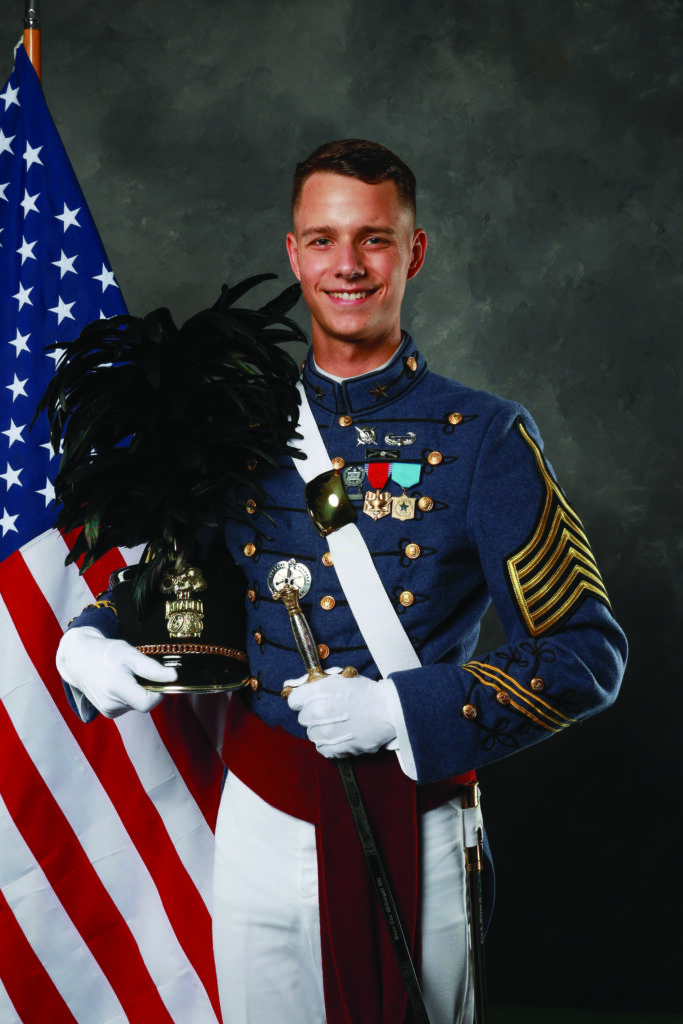When Regimental Commander Sam Wilson, ’25, watched his brother graduate from the U.S. Marine Corps Basic Recruit Training in San Diego, California, in March of 2019, he knew he needed to be a leader. “I saw all these Marines marching rank and file, and I thought, somebody’s going to have to lead them. That’s the ultimate responsibility that I want to take part in and share.”
At The Citadel, Wilson has had plenty of role models to show him the way. As a freshman, the history and English double major was inspired by First Battalion Commander Grant Speer, ’22. “He always led from the front,” said Wilson. “That’s what I want to do. My inspiration from the beginning was to model the way for others.”

For Wilson, leading the way means jumping at every chance to test himself. “My big thing, especially when it comes to school, is that you should seek out every opportunity. You should aspire to do as much as you can so that you’re better able to serve others.”
Wilson has certainly lived up to that creed. The Honors Program student has completed the Army’s Air Assault School, studied abroad at the Royal Military College of Canada and the Royal Military Academy of the Netherlands, and most recently, completed the U.S. Army Special Forces Combat Diver Qualification Course. Known as CDQC, the elite military training course is a grueling mental and physical test that prepares students in surface and sub-surface waterborne infiltration methods.
The course begins with four weeks of pre-dive training at Eglin Air Force Base in Florida. There, Wilson and his fellow students, including Green Berets, Rangers, and Special Forces officers from the United States, Singapore and Mexico, trained on seven events, including a 50-meter underwater swim, drown proofing, underwater knot tying and swimming in a weighted vest.
Participants train on both open-circuit and closed-circuit scuba gear. “Open-circuit is regular scuba stuff—you breathe, and bubbles come to the surface,” said Wilson. “With closed-circuit, the air never leaves, it just gets recycled back through. There won’t be any bubbles, so nobody on the surface can detect you underwater.”
While closed-circuit equipment improves stealth, a lot can go wrong. “You have to learn how to build your rig and take on that responsibility,” said Wilson. He learned that part of such responsibility means owning your mistakes. “We were training with the Special Forces guys we idolize—as a cadet, you don’t want to make a mistake. When I dunked my rig and it didn’t look right, it just took that internal fortitude to speak up. If I had taken it in the water with a deficiency, the result would have been disastrous.” Being responsible for himself meant being responsible for his team. “If your rig goes down, it’s up to your dive buddy to save your life,” he said.
“We were training with the Special Forces guys we idolize …”
Wilson found that ensuring preparedness wasn’t the only part of training to act as a test of character. In one event, every student had to retrieve their fins and masks from the center of the pool at the same time. “There’s a primal response to grab what you need so you can come up and breathe,” said Wilson. “Are you someone who passes on gear to someone else, even when the consequence might be passing out underwater? That was really a gut check for what kind of person I want to be.”
Each exercise tested not only physical ability, but mental control. In a test known as one-man, each diver began submerged in the water wearing a blacked-out mask. When Wilson broke the surface of the pool, an instructor ripped the regulator and hoses out of his gear and tied them behind his back, forcing him blindly to trace back and fix his breathing apparatus. Each diver had three chances to successfully complete this event, and Wilson failed his first attempt. Sitting in the barracks that night with fellow Citadel Cadet Thomas Fitzpatrick, Wilson knew he could not fail again. “I knew I had to make it through, I had to make it work. There was no choice—I couldn’t fail.” When he went into the water the next day, he stayed calm, and it paid off. He finished the event with time to spare.
After weeks of grueling underwater drills, scuba training, and open water swims, Wilson and his fellow divers practiced mock combat dive operations in Key West, Florida. As Wilson emerged from the choppy waves, slowly taking in the cool night sky, a thunderstorm on the horizon, and the rifle in his hands, he knew all the hard work was worth it. “It was transformative,” said Wilson.
